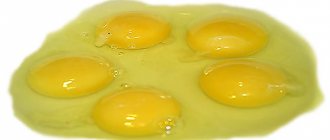Composition of scrambled eggs
To prepare fried eggs, chicken, duck, goose, and quail eggs are used. The composition of the product depends on the conditions of poultry rearing, feeding, and age. Bird eggs contain:
| Content (%) | Chicken | Goose | Duck | Turkey |
| Squirrels | 12,57 | 13,90 | 12,77 | 13,104 |
| Fats | 12,02 | 13,30 | 15,04 | 11,80 |
| Carbohydrates | 0,67 | 1,30 | 0,30 | 1,20 |
| Minerals | 1,07 | 1,10 | 1,08 | 0,80 |
An egg consists of two parts - the yolk (32%) and the white (61%). The latter is a white delicate substance, more viscous near the yolk, liquid near the shell. The chemical composition of protein is so balanced that 97% of nutrients are absorbed from the stomach into the blood without problems. It contains the most proteins (12.7%), which is where the name comes from. In addition, the product contains fats (0.3%), carbohydrates (0.7%), glucose, B vitamins, diastase enzymes, dipeptidase, protease. Protein contains many amino acids:
- ovalbumin – is a reserve of proteins for the development of embryos;
- ovotransferrin – has an antibacterial effect;
- lysozyme is an antibacterial enzyme that destroys bacterial cells and is an allergen;
- ovomucoid – allergen;
- Ovomucin - gives elasticity to the white; in older eggs the white is liquid.
The most important element of an egg is the yolk, which has a high calorie content of 53 kcal. It contains proteins (2.7 g), fats (4.51 g), cholesterol (139 g), polyunsaturated, monounsaturated, saturated fatty acids, which are well absorbed by the body. The vitamins contained in the yolk are useful for the growth and development of body cells:
- A – deficiency leads to deterioration of the condition of the skin, hair, vision, and immunity;
- E – protects cell membranes from damage caused by oxidative processes, preventing oxygen from contacting membrane lipids (antioxidant properties).
- B6 is an antidepressant, lowers cholesterol, promotes the synthesis of proteins, enzymes, hemoglobin, antibodies and other elements, has a positive effect on the heart and muscles.
- D – ensures the absorption of calcium and phosphorus, regulates cell reproduction, promotes the synthesis of hormones. It does not collapse during heat treatment.
- B12 – improves immunity, participates in the metabolism of fats and carbohydrates, and has a positive effect on the functioning of the nervous system. Deficiency causes anemia.
The yolk contains many macroelements. These are potassium, chlorine, iron, magnesium, iodine, zinc, phosphorus, calcium, sulfur, copper, manganese. Potassium and chlorine regulate the acid-base balance of the blood, water balance, and osmotic pressure. Iron is involved in the formation of hemoglobin and is responsible for attaching oxygen atoms to red blood cells, which it then transfers to the cells to participate in oxidative reactions. Iodine promotes the formation of thyroid hormones. Sulfur is necessary for the tissues of the bone, nervous, cartilage systems, hair, nails, and skin.
Phosphorus and calcium, which are part of fried and scrambled eggs, are important for metabolic processes in bone tissue, brain function, cardiac muscles, and the nervous system. Cobalt promotes the synthesis of proteins, fats, carbohydrates, and helps reduce cholesterol. Manganese prevents the deposition of fats in the liver, the development of atherosclerosis, and normalizes the functioning of the hormonal and reproductive systems. Copper promotes the synthesis of collagen, elastin, red blood cells, white blood cells, and affects hair and skin color.
Boiled eggs every day. Is it possible for everyone?
Can anyone eat boiled eggs every day? In fact, the reaction to daily consumption of eggs depends on the individual characteristics of the body. In 70% of healthy people, this “diet” has no effect on the level of total cholesterol and LDL. In 30% of people (the so-called hyperresponders), these indicators may increase slightly. However, according to statistics, this is not a cause for concern. For example, an extensive study conducted by the University of Connecticut in 2006 found no link between egg consumption and the risk of heart disease. Another study by the US Food and Drug Administration, which adjusted for health, lifestyle and dietary factors, found that frequent egg consumption was not associated with increased mortality from cardiac causes.
What are the benefits of scrambled eggs?
Nutritionists have also had their say on the issue of the benefits and harms of scrambled eggs. They claim that having fried eggs for breakfast makes you feel full, which helps curb your appetite and promote weight loss. Although eggs lose some of their elements after heat treatment, scrambled eggs retain many nutrients. The benefits of scrambled eggs lie in the vitamins, minerals, amino acids, fats and other elements they contain, which:
- increase the elasticity of blood vessels and cell membranes, ensuring their integrity;
- normalize oxidative processes;
- improve vision;
- have a positive effect on the skeletal system, preventing osteoporosis;
- regulate the functioning of the nervous system;
- strengthen hair and nails.
Beneficial properties of lutein and lecithin
The pigment lutein, contained in egg yolk, improves visual acuity, protects the eyes from ultraviolet radiation, and has antioxidant properties. Most of this substance is concentrated in the retina, and its deficiency causes destructive changes in its structure, leading to detachment, cataracts, and macular degeneration.
Another important component of the yolk is lecithins - fat-like components, which are a mixture of triglycerides with phospholipids and some other substances. After the breakdown of lecithins in the small intestine, higher fatty acids, phosphoric acid, glycerol and choline (an important component of nervous system cells) are formed, which ensure the transmission of nerve signals to cells and muscles.
The functioning of many organs and systems directly depends on lecithins. The benefits of these substances:
- promote the metabolism of fats in the liver, the regeneration of its cells, and prevent the destruction of hepatocytes;
- normalize metabolic processes;
- have a positive effect on brain function and memory;
- promote energy metabolism;
- regulate insulin levels (choline is responsible for this process);
- take part in homeostasis (self-regulation) of cells.
Lecithin deficiency leads to early cell wear, loss of tissue regeneration ability, serious illnesses, and early old age. Only normalizing lecithin levels will help here, and scrambled eggs can help with this. It is worth noting that an excess of these substances can provoke cardiovascular diseases, so you should not get carried away with their use.
Are breakfast cereals harmful?
The advantage of breakfast cereals is that they are convenient and quick to prepare: add milk (yogurt, juice, water) and you’re done. But the harm caused to the body is enormous. In addition to vitamins and microelements, they contain large quantities of sugar, starch, flour, preservatives, dyes and other synthetic additives.
Daily consumption of breakfast cereals can lead to metabolic disorders, disorders of the gastrointestinal tract, kidneys and liver, and cause obesity.
The harm of scrambled eggs
When the topic “The benefits and harms of scrambled eggs” is discussed, cholesterol (a type of fatty alcohol) is often mentioned. One yolk of a large chicken egg contains 213 mg of this substance, while the daily intake is 300 mg. The body produces eighty percent of cholesterol on its own: it is needed to ensure the stability of cell membranes, the production of steroid hormones, vitamin D, and bile acids.
Excess cholesterol leads to atherosclerosis, in which fatty alcohol is deposited on the walls of blood vessels. This leads to the formation of plaques that injure veins and arteries, which increases the risk of blood clots. Over time, cholesterol plaques grow, which leads to loss of elasticity of blood vessels, their blockage, and can provoke rupture and hemorrhage into surrounding tissues. Situations where such damage affects the heart or brain are deadly.
Nutritionists say that eating 1-2 eggs a day will not cause harm, since the effect of cholesterol on the body depends on the transport proteins that carry it to the cells. This is done by low-density lipoproteins, which tend to settle on the walls of blood vessels along with cholesterol. They are counteracted by high-density lipoproteins, which remove excess cholesterol from the body, removing it from the walls of blood vessels.
Choline and lecithin, which scrambled eggs contain, contribute to the synthesis of lipoproteins and maintain cholesterol levels at the desired level. Choline improves the functioning of the liver, which produces fatty alcohol, and promotes the synthesis and processing of lipoproteins. Lecithin increases the production of bile, in the formation of which cholesterol is involved, due to which its level in the blood decreases.
- How to treat warts on fingers
- How to treat bedsores with folk remedies at home
- Right kidney pyelectasis
For these reasons, cholesterol in scrambled eggs contributes little to the development of atherosclerosis. The exception is people with metabolic disorders, due to which the liver synthesizes an increased amount of low-density lipoproteins and cannot cope with the processing of harmful cholesterol. People whose parents have had a heart attack or stroke are also at risk.
Salmonellosis
Scrambled eggs can provoke salmonellosis, an infectious disease of the digestive system caused by non-spore-bearing bacteria. Once in the body, salmonella settle in the small intestine and begin to release toxins. This leads to dehydration, damage to the nervous system, and decreased vascular tone. The disease manifests itself with nausea, vomiting, high fever, diarrhea, and abdominal pain.
You can catch the disease after eating contaminated food, including fried eggs. However, this rarely happens, since eggs at poultry farms undergo special processing and checks. To reduce the risk of infection to a minimum, you should buy eggs from a trusted manufacturer, rinse well before use, and do not eat raw.
Allergy
Chicken eggs contain a large amount of vitamins, minerals, amino acids and other substances that can provoke the development of an allergic reaction (children often suffer from this). Basically, allergies occur to protein. This is explained by the fact that its main function is to protect the embryo from the negative effects of aggressive substances. The main cause of allergies is its constituents ovalbumin, lysozyme, ovomucoid, conalbumin.
Allergy manifests itself with the following symptoms:
- itching;
- rash;
- skin redness;
- swelling;
- asthma;
- tearfulness;
- nausea, vomiting, diarrhea.
If you are allergic to eggs, you should avoid eating them, and be sure to check the ingredients of the products before purchasing. It is necessary to exclude many sauces, mayonnaise, pasta, store-bought baked goods, some meat products, etc. from the diet. Eggs can be replaced with proteins of plant or animal origin, or with special substitutes. When baking at home, you can use baking powder or yeast instead of eggs. If you are allergic only to protein, you can add yolk to the dish.
Why is breakfast bad?
Immediately after waking up, the digestive system has not yet started and any, even the lightest and most healthy food, is stress for the body.
Experts do not recommend having breakfast within 1-2 hours after sleep.
Traditionally, foods that are fatty and heavy on the stomach are considered harmful for breakfast:
- meat (except lean poultry);
- any fast food (sandwiches, chips, crackers, snacks, smoked meats);
- fatty dairy products (sour cream, full-fat cottage cheese, cream);
- sweets, baked goods, baked goods (buns, cakes).
Fatty foods take a long time to digest, cause a feeling of heaviness in the stomach, provoke fatigue, apathy and irritation. Foods containing large amounts of sugar provoke the accumulation of fat in the body and cause a rapid feeling of hunger.
Scrambled eggs while dieting
Chicken eggs are often included in various diets due to the large number of useful substances. Scrambled eggs during a diet should be prepared taking into account the calorie content of the product. One fried chicken egg contains 110 kcal, but if you add sausage to the scrambled eggs, these figures will increase to 185 kcal. If the dish is cooked in vegetable oil, its calorie content will also increase sharply. For this reason, nutritionists advise steaming, boiling or eating eggs as an omelet (containing milk) without adding oil.
The most harmful breakfasts
The most harmful breakfast is solid:
- Fast food: hamburger with fried potatoes, roll with fresh vegetables;
- A sausage sandwich;
- Energy and chocolate bars;
- Curd and processed cheeses.
This is a real blow to the body, the consequences of which it will struggle with for at least a day.
Is it possible to drink eggs every day?
Some people prefer raw eggs to boiled ones and explain their choice by the fact that they retain more nutrients. This is true, but there is a downside to this choice. Eggs that have not undergone heat treatment may contain harmful bacteria - salmonella. It causes an acute infectious disease, which often leads to serious complications and even death. Of course, the probability of encountering a bacterium is small, but it still exists. Therefore, it is not recommended to abuse raw eggs.
Can children have eggs?
Can children eat eggs every day? This is a valuable product that must be present in a child’s diet, but do not forget about a sense of proportion. So is it possible to give your child an egg every day? Theoretically, a baby can eat an egg daily and remain within the classic recommended limit of 300 mg of cholesterol per day. But, most likely, he gets enough cholesterol from other foods during the day: milk, cheeses, yoghurts, meat products. In this case, giving your baby eggs on a daily basis may not be a good idea.
Therefore, many nutritionists recommend not making scrambled eggs and omelettes a daily habit. It is best if they appear on the table 3-4 times a week. If one egg is not enough for a child, you can add one or two more whites instead of whole eggs.
However, it is worth noting that the negative effect of daily eating and “overdose” of eggs in healthy people has never been recorded, so the three hundred milligram rule remains only one opinion.
Another important fact: eggs are a common food allergen for children. Allergies occur in approximately 2% of children, but are rare in adults. For 60-70% of allergy sufferers, it is perfectly acceptable to eat eggs in desserts and baked goods.











